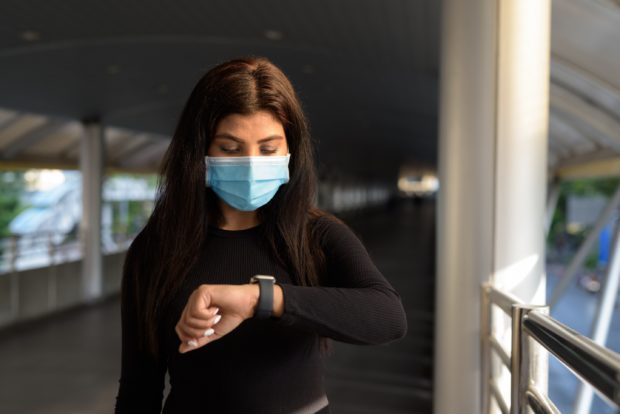
Researchers at the Mount Sinai Hospital found that wearables like the Apple Watch were able to identify cases of Covid-19 earlier than traditional diagnostic methods. Image: Ranta Images/Getty Images
Wearable technologies could help detect Covid-19 symptoms earlier than traditional methods of diagnosis, research suggests. The new study from the U.S. highlights the advantages of such devices when it comes to meeting health needs during a pandemic.
Researchers at the Mount Sinai Hospital found that wearables like the Apple Watch were able to identify cases of Covid-19 earlier than traditional diagnostic methods. The news may sound surprising, but the findings are based on a scientific study involving several hundred participants — namely health care workers recruited throughout the Mount Sinai Health System.
The study was conducted between April and September 2020, in the midst of the Covid-19 pandemic. Each participant wore an Apple Watch and answered daily questions via a customized app. The researchers studied changes in participants’ heart rate variability (HRV) to identify and predict whether they were infected with or suffering symptoms of Covid-19. They also collected other daily symptoms such as fever or chills, tiredness or weakness, body aches, dry cough, sneezing, runny nose, diarrhea, sore throat, headache, shortness of breath, loss of smell or taste, and itchy eyes.
Technology at the service of health needs
Published in the Journal of Medical Internet Research, the findings suggest that “subtle changes” in participants’ HRV, measured by the Apple Watch, were able to signal the onset of Covid-19 well before diagnosis by traditional methods.
“This study highlights the future of digital health,” says the study’s corresponding author, Robert P. Hirten, MD. “It shows that we can use these technologies to better address evolving health needs, which will hopefully help us improve the management of disease. Our goal is to operationalize these platforms to improve the health of our patients and this study is a significant step in that direction. Developing a way to identify people who might be sick even before they know they are infected would be a breakthrough in the management of Covid-19.”
The researchers also observed that the HRV pattern began to normalize between 7 and 14 days after Covid-19 diagnosis, and was no longer statistically different from the patterns of those who were not infected. They suggest that wearables could be used to monitor patients remotely and intervene if or when necessary — a useful approach during periods of restricted movement and social contact.
The next step for the study is to analyze biometric indicators like HRV, sleep disruption and physical activity to identify which healthcare workers could be at risk of the psychological effects of the pandemic. NVG
RELATED STORIES:
This mobile app lets users communicate with eye gestures only
COVID-19 vaccination centers coming to Google Maps